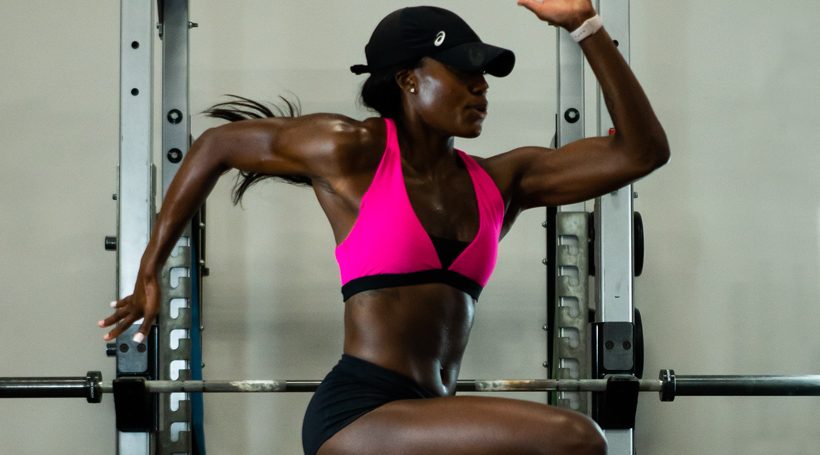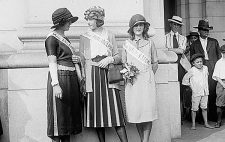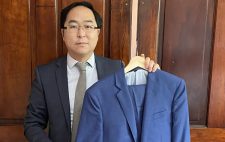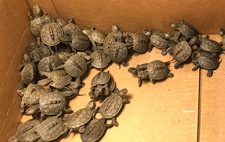Priscilla Frederick-Loomis just wanted to be in show business. As a student at Paul VI High School, her true love was theater and dance. Track and field was just a hobby – she had no idea it would become the center of her life.
“I never took it seriously until my senior year,” says Loomis, now 32. “Most people, by their junior year, are panicking about where they’re going to school. I just knew I wanted to be in entertainment – wanted to be on Broadway. My superlative in the yearbook was ‘Most likely to be America’s Next Top Model.’ I was praying, legitimately every day, that I would be able to move to New York and just entertain.”
 Loomis thought the ticket to her dream was a New York City college, but she worried her single mom would never be able to afford it.
Loomis thought the ticket to her dream was a New York City college, but she worried her single mom would never be able to afford it.
“I went to my guidance counselor and was like, I can’t afford college. He said you can get an athletic or academic scholarship. I was ok at sports, but nothing crazy. I was good, not great.”
Loomis participated in the high jump – an event that requires competitors to get a running start to jump over a horizontal bar, landing on a crash pad on the other side.
“The guidance counselor was like, ‘I don’t think you’re good enough to get a full ride.’ It was the first time somebody had called me out like that,” she says. “I just thought, I don’t really like what he said, it’s time to change.”
Loomis got serious about the high jump. She began winning meets and jumped a new school record that stands to this day. It was the day after prom, she recalls. “I got like 4 hours of sleep, woke up and jumped 5 feet 9 inches.”
She won at the county level and the regional level, and very soon had the attention of college scouts. She accepted an offer from St. John’s University in Queens, New York. It seemed like a step toward the dream of working in entertainment that Loomis still hadn’t given up on.
“I remember asking my nutritionist how I could run track and be thin enough to model? I had an athletic build, but all the girls who were doing what I wanted to do were so thin,” she says. “I was like, how can I look like that and also run track? I remember her face being like what?”
Once college training began, it was clear track would be Loomis’ primary focus. There wasn’t time for auditions, rehearsals or modeling calls.
“My mom said I should use track as a way to get into entertainment. She said, ‘You can always act, you can always model, but you can’t always do this,’” Loomis says. “So then my goal was to be the best at St. John’s, be in the spotlight and do better than anybody else, so I could make a name for myself.”
Loomis kept winning, and in 2012 found herself at the U.S. Olympic Team trials. “I was tied for first going into finals, with people who have been training for the Olympics forever, and I’m just some girl,” she says. “I placed 7th, but I was so excited, and afterward I was asked for an autograph. I told the young person I didn’t win and I wasn’t going to the Olympics, and they were like, we don’t care, we had such a good time, you entertained us.”
It was a sign, Loomis says, that she was exactly where she was supposed to be.
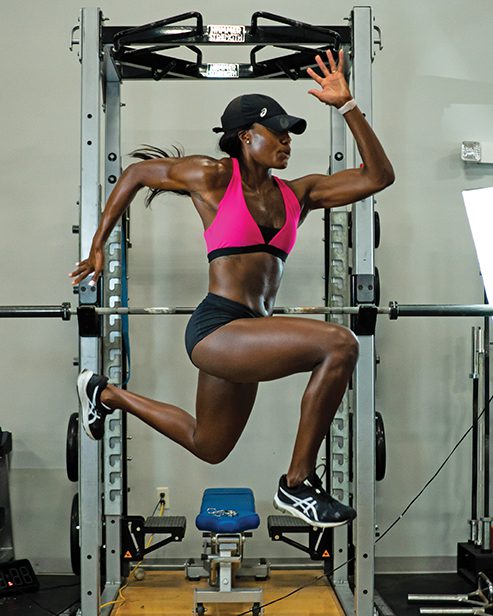
“It may not be exactly what I thought. It’s a different stage, a different crowd, but I’m in entertainment,” she says. “I got my stage. I got my applause, my autographs.”
After the 2012 trials, Loomis took some time off and moved back home to South Jersey. She went to work in community outreach at a nonprofit. Within a few months, she knew she wasn’t ready to retire, and the Olympic dream wasn’t dead. She wanted to train for 2016.
“But training takes money,” Loomis says. She didn’t have the resources of her fellow elite high jumpers. “The U.S. wasn’t going to help, because they didn’t need me. They had their athletes, and in a lot of ways I wasn’t anywhere near them. I don’t train at the Olympic training center. I don’t have a massage therapist, a coaching team.”
Around the same time, Loomis had started digging into her ancestry. Her father wasn’t very involved in her life and until then, she knew little about his home country – Antigua and Barbuda. The more she learned, the more connected she felt to the island nation.
“It was healing,” she says. “I never was attached to it because of the strained relationship I had with him. This was my way to get to know a part of me I didn’t know, on my terms.”

Loomis began competing for Antigua and Barbuda, and in 2016 she qualified to represent the country at the summer games in Rio de Janeiro, Brazil.
“I have always been the underdog,” she says, “and so looking at Antigua and Barbuda, I was like, it’s a small country, an island not many people know about. They’re the underdog! I wanted to put the island on my shoulders and give respect to its name.”
In Rio, Loomis placed 28th overall. Again, she considered retirement. But her post-competition path wasn’t clear.
“I put all this effort into training for the Olympics, then I had like a hangover for a year,” she says. “It was like I did this huge thing, trained for 4 or 5 years, and now it’s over. And I’m in the exact same place that I was. I still live in my mom’s basement.”
Before the end of the year, Loomis was training again, her sights set on the 2020 Olympics. But to pay for gym time, coaching and travel, she had to get creative.
“This whole journey has been a lot more difficult than people can imagine,” she says. “One of the difficult things is people think I’m this millionaire. Nope. I got a job as a morning radio show host. I do that 5 days a week, and I started my own cleaning business in 2016 to pay to train. I also started a GoFundMe.”
At first, she says, it was disheartening. But eventually, she realized it was all a part of chasing her dream. “It’s really embarrassing to be an Olympian scrubbing toilets,” she says. “It was embarrassing that I had to ask people for help on GoFundMe. But I had to just change my narrative. Like you know what, some people have Nike or Adidas…this community is my sponsorship.”
A few weeks before it was announced that the 2020 Olympics in Tokyo would be rescheduled to 2021, Loomis was diagnosed with Covid-19. For 2 months, she struggled to recover. “I had these massive chest pains that just weren’t going away,” she says. “On March 17, I got an MRI of my lungs, and the doctor who looked at it said I had to stop training. I went out and bought rosé and M&M’s. I was like well, my life is over. I have to tell my family, my fans, my country.”
Just a few days later, she got a second opinion. That doctor delivered different news. “He tells me, ‘You’re 100% fine, get back to training.’ What an emotional rollercoaster that was.”
Loomis got back to training and competing, but the challenges continued. Ongoing Covid restrictions meant she couldn’t compete as an individual at the NCAA meets close to home, so she spent months traveling long distances to compete at private colleges and universities.
“My event is my life – every time I clear the bar, they raise it,” she laughs. But in late June, Loomis encountered a bar she couldn’t clear. Just 2 days before they were scheduled to begin, Antigua and Barbuda cancelled their Nationals, citing concerns over Covid-19 safety protocols. It was the event Loomis was depending on to qualify for her second Olympic games.
The cancellation left Loomis ranked 36th in the world; 4 slots short of the top 32 going to Tokyo.
“It was heartbreaking,” she says. “But to be that close – to miss it by just 4 spots – I have to be proud of myself for that.”
Loomis says she’ll take the summer to relax and recover from the disappointment, then open a whole new chapter.
“I am officially retired. I’m throwing my retirement party,” she says. “Everyone always focuses on the people who make it. The champions. But there’s many people who work so hard and when they fall short, they feel like failures. No one teaches them how to heal, and that they can learn from each experience. I’m trying to be an example of that. Through this experience, I realized how strong I am. Now I have to change the narrative, be positive, and look toward the future.”


